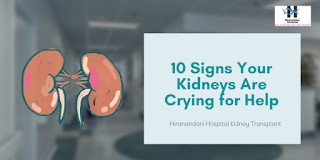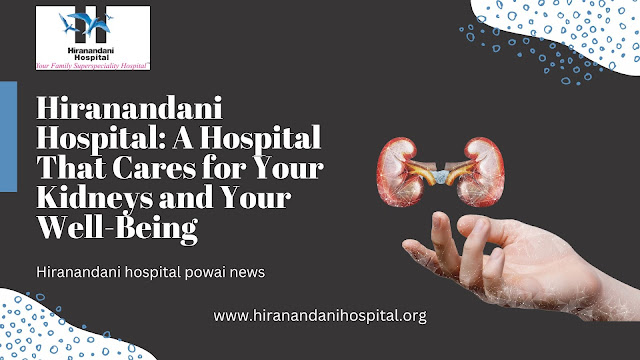10 Signs Your Kidneys Are Crying for Help
Introduction
Your kidneys are essential organs responsible for filtering
waste and excess fluids from your blood, maintaining the body's overall
chemical balance, and producing essential hormones. While they work diligently
to keep your body healthy, kidneys can sometimes encounter issues that require
attention. It is crucial to be aware of the signs that your kidneys might be
struggling to function optimally. In this blog, we will discuss ten warning
signs that may indicate your kidneys are crying for help.
Frequent Urination or Urgency
One of the primary functions of the kidneys is to
regulate fluid balance in the body. If your kidneys are not functioning
properly, you may experience an increased frequency of urination or a
persistent sense of urgency. According to Dr. Sujit Chatterjee, CEO of Hiranandani
Hospital Kidney Transplant, this occurs because your kidneys struggle
to concentrate urine properly, leading to more frequent trips to the bathroom.
Changes in Urine Color and Odor
Healthy urine is usually pale yellow or straw-colored with a
mild odor. If your kidneys are not functioning well, you may notice changes in
the color and smell of your urine. Darker or cloudy urine, blood in the urine,
or a strong ammonia-like odor may indicate a potential kidney issue.
Swelling in Extremities
When the kidneys are unable to eliminate excess fluid and
waste from the body, it can lead to edema - swelling in the hands, feet,
ankles, or face. Edema occurs due to water retention caused by impaired kidney
function, resulting in a buildup of fluids in various parts of the body.
Fatigue and Weakness
Kidneys play a crucial role in producing a hormone called
erythropoietin, which stimulates the production of red blood cells. When kidney
function is compromised, the production of red blood cells can decrease,
leading to anemia. Fatigue, weakness, and a constant feeling of tiredness may
be signs of kidney-related anemia.
Persistent Back Pain
Kidneys are located on either side of your spine in the
lower back. Kidney issues can cause persistent back pain, specifically in the
area just below the rib cage. The pain may be dull and continuous or sharp and
severe, depending on the underlying cause.
Changes in Urinary Habits
Apart from increased frequency, kidney problems can cause
other changes in urinary habits. These may include pain or burning sensation
during urination, difficulty starting or maintaining a steady stream of urine,
or feeling like the bladder is not completely empty after urination.
Nausea and Vomiting
Kidney dysfunction can lead to a buildup of waste products
and toxins in the bloodstream, which can make you feel nauseous and result in
vomiting. Persistent nausea and vomiting, especially if accompanied by other
symptoms, should not be ignored.
Shortness of Breath
When kidneys are unable to remove excess fluid from the
body, it can lead to fluid buildup in the lungs, resulting in shortness of
breath or difficulty breathing. If you notice unexplained or sudden
breathlessness, seek medical attention promptly.
Metallic Taste in the Mouth
The accumulation of waste products in the blood due to
impaired kidney function can cause a metallic taste in your mouth. This
unpleasant taste can linger even after eating or drinking, indicating potential
kidney issues.
High Blood Pressure
Healthy kidneys help regulate blood pressure by maintaining
the right balance of electrolytes and fluids in the body. If the kidneys are
not functioning properly, it can lead to hypertension (high blood pressure),
which, in turn, can further damage the kidneys, creating a dangerous cycle.
Prevention and Kidney Health Maintenance
While some kidney problems may arise due to genetic factors
or other health conditions, taking proactive steps to maintain kidney health
can significantly reduce the risk of kidney-related issues. Here are some
essential tips by Hiranandani
Hospital Kidney Care for promoting kidney health:
Stay Hydrated: Adequate hydration is crucial for
kidney function. Drinking plenty of water helps flush out toxins and waste
products from the body, supporting healthy kidney function. Aim to drink at
least 8 cups (64 ounces) of water per day, but individual water needs may vary
based on factors like age, activity level, and climate.
Follow a Balanced Diet: A well-balanced diet is vital
for overall health, including kidney health. Incorporate a variety of fruits,
vegetables, whole grains, lean proteins, and healthy fats into your daily
meals. Limit your intake of processed foods, sodium, and sugar, as they can
strain the kidneys.
Manage Blood Pressure: High blood pressure can damage
the kidneys over time. Regularly monitor your blood pressure and take steps to
manage it within a healthy range. Lifestyle changes like regular exercise,
reducing salt intake, and managing stress can help maintain healthy blood
pressure levels.
Exercise Regularly: Engaging in regular physical
activity not only promotes cardiovascular health but also aids in maintaining
kidney health. Exercise helps improve blood circulation, which supports the
kidneys in their filtration process.
Avoid Over-the-Counter Painkillers: Overuse of
non-steroidal anti-inflammatory drugs (NSAIDs) like ibuprofen and aspirin can
be harmful to the kidneys. If you have chronic pain, consult your healthcare
provider to explore safer alternatives.
Quit Smoking: Smoking can worsen kidney function and
is linked to various kidney diseases. Quitting smoking will not only benefit
your kidneys but also your overall health.
Limit Alcohol Consumption: Excessive alcohol
consumption can negatively impact kidney function and may lead to kidney
damage. Stick to moderate alcohol consumption or abstain altogether.
Regular Check-ups: Regular health check-ups are
essential for monitoring kidney health, especially if you have a family history
of kidney problems or other risk factors. Your healthcare provider can perform
simple tests, such as blood and urine tests, to assess kidney function.
Manage Diabetes: If you have diabetes, it is crucial
to manage your blood sugar levels effectively. High blood sugar can damage the
blood vessels in the kidneys, leading to kidney disease.
Avoid Excessive Protein Intake: While protein is
essential for body function, excessive protein consumption can strain the
kidneys. For individuals with healthy kidneys, a balanced protein intake is
generally safe.
Conclusion
Your kidneys are remarkable organs that play a crucial role
in maintaining your overall health. Paying attention to the signs that your
kidneys may be struggling is vital to ensure early detection and timely
intervention, preventing further complications. Incorporating healthy lifestyle
habits, such as staying hydrated, eating a balanced diet, and exercising
regularly, can go a long way in supporting kidney health and preventing
kidney-related issues.
Remember that everyone's health is unique, and any concerns
about your kidney health should be discussed with a healthcare professional.
Regular health check-ups and proactive measures will not only help your kidneys
but also contribute to your overall well-being, allowing you to lead a
healthier and more fulfilling life.
Take care of your kidneys, and they will take care of you!



Comments
Post a Comment